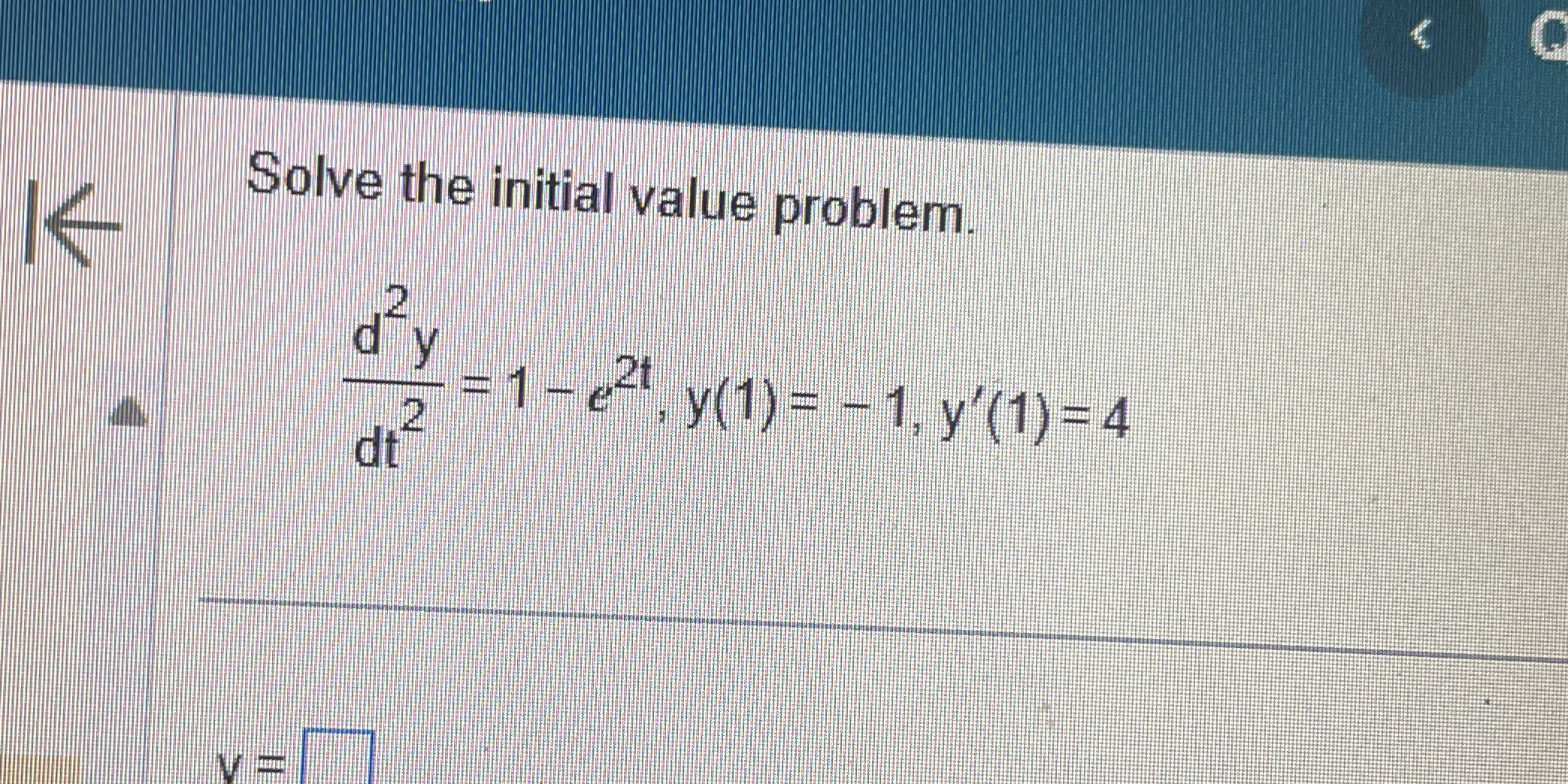Solve the initial value problem: d²y/dt² = 1 - e^(-2t), y(1) = -1, y'(1) = 4.

Understand the Problem
The question is asking to solve a second-order differential equation with given initial conditions. The problem involves finding a function y(t) that satisfies the equation and initial values provided.
Answer
$$ y(t) = \frac{t^2}{2} - \frac{1}{4}e^{-2t} + (3 + e^{-2})t + (C_2) $$
Answer for screen readers
The solution to the initial value problem is:
$$ y(t) = \frac{t^2}{2} - \frac{1}{4}e^{-2t} + (3 + e^{-2})t - \frac{3}{4} + \frac{5}{4}e^{-2} $$
Steps to Solve
- Integrate the Differential Equation
To solve the second-order differential equation $$ \frac{d^{2}y}{dt^{2}} = 1 - e^{-2t} $$, we first integrate it with respect to ( t ).
$$ \frac{dy}{dt} = \int (1 - e^{-2t}) , dt $$
The integral can be computed as:
$$ \frac{dy}{dt} = t + \frac{1}{2}e^{-2t} + C_1 $$
where ( C_1 ) is the constant of integration.
- Second Integration
Next, we integrate again to find ( y(t) ):
$$ y(t) = \int \left(t + \frac{1}{2}e^{-2t} + C_1\right) dt $$
Calculating the integral gives:
$$ y(t) = \frac{t^2}{2} - \frac{1}{4}e^{-2t} + C_1t + C_2 $$
where ( C_2 ) is another constant of integration.
- Applying Initial Conditions
Now, we apply the initial conditions ( y(1) = -1 ) and ( y'(1) = 4 ).
First, calculate ( y(1) ): $$ -1 = \frac{1^2}{2} - \frac{1}{4}e^{-2} + C_1 \cdot 1 + C_2 $$
This simplifies to: $$ -1 = \frac{1}{2} - \frac{1}{4}e^{-2} + C_1 + C_2 $$
Next, calculate ( y'(1) ): $$ y'(1) = 1 + \frac{1}{2}(-2)e^{-2} + C_1 = 4 $$
This simplifies to: $$ 1 - e^{-2} + C_1 = 4 $$
- Solving for Constants
From ( 1 - e^{-2} + C_1 = 4 ): $$ C_1 = 4 - 1 + e^{-2} = 3 + e^{-2} $$
Substituting ( C_1 ) into the first condition:
$$ -1 = \frac{1}{2} - \frac{1}{4}e^{-2} + (3 + e^{-2}) + C_2 $$
This simplifies to: $$ C_2 = -1 - \frac{1}{2} + \frac{1}{4}e^{-2} - 3 - e^{-2} $$
- Final Equation
Thus, we can plug back the values of ( C_1 ) and ( C_2 ) to obtain the complete solution.
The final function ( y(t) ) becomes:
$$ y(t) = \frac{t^2}{2} - \frac{1}{4}e^{-2t} + (3 + e^{-2})t + C_2 $$
- Final Simplification
You will compute the exact values for ( C_2 ) finally using the obtained expressions and simplify ( y(t) ).
The solution to the initial value problem is:
$$ y(t) = \frac{t^2}{2} - \frac{1}{4}e^{-2t} + (3 + e^{-2})t - \frac{3}{4} + \frac{5}{4}e^{-2} $$
More Information
This solution involves calculating two integrals and applying initial boundary conditions to determine the specific constants. The expression combines polynomial and exponential functions.
Tips
- Forgetting to integrate constants after each step.
- Miscalculating the substitution of initial conditions.
- Not simplifying the expressions properly before solving for constants.
AI-generated content may contain errors. Please verify critical information